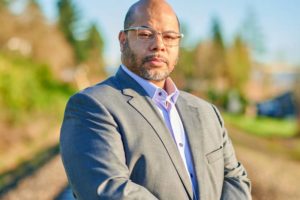In 2025, a committee of advocates will propose how New Jersey can implement reparations for Black people. Here’s what we know so far.
This is your first of three free stories this month. Become a free or sustaining member to read unlimited articles, webinars and ebooks.Become A Member
This story was co-published part with The Jersey Bee as part of our joint Equitable Cities Reporting Fellowship, examining segregation in Newark and Essex County, New Jersey.
Shortly after the Ku Klux Klan marched through Newark, New Jersey, in the 1920s, large areas of the city and surrounding communities were redlined by the federal government as investment risks because Black people lived there. The discriminatory practice of redlining locked generations of Black families out of equitable access to jobs, housing, schools, and other wealth-building resources.
Redlining built on the legacy of slavery and has since evolved into modern-day segregation, where racially diverse and low-income communities continue to have limited access to economic and public health opportunities.
Read more: In Essex County, New Jersey’s history of segregation persists
Nearly 60 years after the formal end of federal redlining and the passage of the Civil Rights Act, Black and Latinx households in Essex County are half as likely to own a home than white households and three times more likely to live in poverty than white residents.
After years of failed reparations bills, a self-organized group of advocates and experts is well underway on a plan to study the harms of slavery and racial segregation in the former “slave state of the North.”

A group of Klu Klux Klan members marched through Newark, N.J., in the mid-1920s. (Archive photo courtesy of the Montclair History Center via the Newark Public Library. Original by Harry C. Dorer.)
Convened by the New Jersey Institute for Social Justice (NJISJ), a nonprofit advocacy organization, the New Jersey Reparations Council came together on Juneteenth 2023 to launch its two-year study.
NJISJ has been a leading advocate for establishing a Reparations Task Force in the New Jersey legislature since 2019 and launched a public education campaign on reparations called “Say the Word” in 2021. Its 47-member council includes nine committees focused on issues like the history of slavery, structural racism in the economy, and current-day segregation in New Jersey.
Key questions for the Council include who would be eligible for reparations, how they would be funded, and how to translate the Council’s research into state law.
Jean-Pierre Brutus, senior counsel at NJISJ, says the group is exploring these questions with an “abundance mindset.”
“It’s not a question of limited resources. We need to be transformative in the way we approach this,” Brutus says. “We’re thinking about the harms of slavery, and not just harm [of] slavery, but its aftermath, which are ongoing and affect all Black people.”
New Jersey’s history of reparations spans at least twenty years
The creation of the New Jersey Reparations Council comes after nearly two decades of failed reparations bills.
Most recently, New Jersey Black Caucus members tried to introduce a Reparations Task Force bill in 2019 and again in 2022, even securing resolution support from Essex County, Newark, Orange, and 15 other municipalities. Neither of these bills made it to the floor for a full vote.
Before the 2019 task force bill, former Essex County Assemblyman Craig Stanley tried to introduce a Reconciliation Commission act as far back as 2005. The billwould have established a commission to examine past and current conditions facing Black Americans and make recommendations to achieve reconciliation and justice. It also did not reach the full assembly for a vote.
Sen. Britnee Timberlake, a co-sponsor of the Reparations Task Force bill, says it may be time to consider alternative means to study reparations. She says misconceptions about reparations and pushback on the term itself made it difficult for her and her colleagues to move the bill forward.
“There was a lot of inflammatory assumptions that occurred, which really slowed the progress down,” says Timberlake, who represents New Jersey’s 34th District in the State Senate.
She thinks that “outsourcing” the work of studying reparations to universities or community groups would help remove some political bureaucracy, adding it would free up time for lawmakers to focus on building important allies within the legislature.
“Let’s use our energy capital for actual reparations,” Timberlake says.
Early findings from the New Jersey Reparations Council
On Juneteenth 2024, one year after the Council’s launch, members from the New Jersey Reparations Council shared their initial findings in Newark about the impact of slavery.
Leslie Alexander, a history professor at Rutgers University and member of the historical committee, says that her committee’s first task was helping people understand that slavery existed in the state. New Jersey was the last Northern state to abolish slavery in 1866, months after the United States abolished slavery in 1865.
“The very founding of the colony was predicated on the enslavement of African people,” Alexander says. She adds that understanding the “marriage of white supremacy and capitalism” is key to understanding slavery’s legacy and segregation today.

New Jersey Reparations Council members share an update on their two-year plan to study reparations on Juneteenth 2024. (Photo courtesy NJISJ)
“The reality is that wealth in this country is based on the enslavement of African people. That’s the bottom line,” Alexander says.
Dr. Denise V. Rodgers, Vice Chancellor at Rutgers Biomedical & Health Sciences and member of the health equity committee, highlighted the state’s high Black infant mortality rate. In New Jersey, Black babies are 3.5x more likely to die than white babies.
While the state has made progress on Black health disparities, Rodgers says, it was only in recent years that advocates have drawn a clear throughline between a person’s health and racism.
“It is very clear that the more resources you have the longer you live and the better, the higher quality of your life,” she says.
Alexis Karteron, professor at NYU School of Law and member of the public safety and justice committee, says that she has been looking at how slavery has shaped today’s criminal justice system, including carceral practices beyond incarceration.
“We also need to talk more about other forms of carceral control, things like probation and parole that continue to have a stranglehold on people’s lives long after they are released from jail and prison,” Karteron says.
Other members shared updates from their committees, including research on the role of institutional religion in slavery and the limitations of the Mount Laurel doctrine on addressing racial segregation.
Lessons from other states
New Jersey is not the first state to attempt to offer reparations, something Brutus hopes will work to the Council’s benefit.
“We’re always trying to learn best practices from other places and states,” Brutus says.
In July 2024, California allocated $12 million out of its $297.8 billion state budget to roll out a reparations program. It doesn’t include funds for direct cash payments but instead focuses on building the infrastructure to administer reparations.
Evanston, Illinois became the first city to offer Black Americans for past housing discrimination in 2021, but it hasn’t come without legal challenges. In May 2024, a conservative nonprofit Judicial Watch filed a civil lawsuit against the city, claiming the program is unconstitutional. Prism reported that supporters of the program say the lawsuit is an attempt to undermine the purpose of reparations: addressing past harms against Black people.
New York and Chicago also launched city- or state-backed reparations task forces in 2024.
Brutus says the Council is also exploring other models to sustain the work after the final report in 2025. Robert Wood Johnson Foundation, a prominent public health funder based in New Jersey, has supported the Council’s efforts to explore reparations in the state and has spent millions to redefine reparations across the country in the last few years.
He encourages the public to think of reparations as an ongoing practice.
“[Reparations] is a process, a process to get to the end goal of racial justice, of freedom for Black people, and thus freedom for all people.”
Who would be eligible for reparations in New Jersey?
The Council takes a position that all Black people in New Jersey should be eligible for reparations, Brutus says. This would include descendants of enslaved people along with Black immigrants who are subjected to ongoing structural racism and segregation.
“Regardless of where you come from as a Black person, if you are living in New Jersey as a Black person, you’re subjected to those harms.”
This approach hasn’t come without criticism. During the Council’s prior public sessions, several attendees raised concerns that any reparations for Black people must be lineage-based, meaning only descendants of enslaved people should be eligible.
Brutus notes the challenges of limiting reparations to descendants of enslaved people, such as the difficulties of tracing ancestry, and called on the community to help the Council think of reparations expansively.
What could reparations include?
“Any kind of reparations program or proposal or policy recommendation that we’re coming up with is going to be commensurate proportional to the harms,” Brutus says.
Brutus says reparations could include financial compensation for Black residents in New Jersey along with other forms of reparation, such as reparative policies and programs.
Sharif Braxton, community officer of the Robert Wood Johnson Foundation which funds the Council’s efforts, agrees. He says that while cash reimbursements are one way people can receive reparations for economic exclusion, people harmed by systems are excluded from society in other ways, like access to housing, safe and affordable food, and quality education.
Sen. Timberlake says this could look like reparations programs, such as down payment assistance to purchase homes or small business grants. “There’s a lot of different ways that reparations could be rolled out,” she says.
Will recommendations become law?
From September through December, the New Jersey Reparations Council will host a series of public comment sessions where the public can share live comments. The Council says the online meetings will help inform the recommendations they release in 2025, including reparations eligibility and what reparations could look like. The Council will release its final recommendation report on Juneteenth 2025.
Since the Council was formed without any formal legislation, there is no legal mandate for New Jersey to consider the Council’s recommendation.
Braxton of the Robert Wood Johnson Foundation says that legislative commitment and buy-in will be key to implementing reparations in the future.
“[There] needs to be some commitment in doing some form of repair,” Braxton says.
While Brutus says finding legislative partners is on the Council’s radar, he doesn’t want people to think the Council isn’t already doing this. He says the Council has been working wih Assemblywoman Shavonda Sumter, who represents New Jersey’s 35th District in the State Assembly and co-sponsor of the Reparations Task Force bill.
“The work of the council doesn’t end with the report, right?” Brutus says.
Like what you’re reading? Get a browser notification whenever we post a new story.

Kimberly Izar is Next City’s Equitable Cities Reporting Fellow for Segregation, in partnership with The Jersey Bee in Essex County, New Jersey. She covers a range of issues, including food access, public housing, labor, and Asian American arts and culture. Her work has been featured in NPR, Gothamist, Prism, WBAI and others. Previously, Kim was a movement fundraiser for nearly a decade. She received her M.A. in Engagement Journalism from the Craig Newmark Graduate School of Journalism at CUNY.
Source: https://nextcity.org/features/new-jersey-newark-reparations-commission




